Agenda Item 2 General Debate: Presentation of the written update on the implementation of HRC Resolution 30/1 by the High Commissioner for Human Rights pursuant to HRC resolution 40/1, OHCHR Report on ‘Promoting reconciliation, accountability and human rights in Sri Lanka’ (A/HRC/43/19)
27 February 2020
Statement by Hon. Dinesh Gunawardena, Minister of Foreign Relations, Skills Development, Employment and Labour Relations of Sri Lanka
Madam President,
Madam High Commissioner,
Members of the HRC and Delegates to the 43rd Session of HRC,
Ladies and gentlemen,
As this Council deliberates on the written update presented by the High Commissioner on progress regarding the implementation of HRC Resolution 30/1, I wish to reiterate that Sri Lanka remains committed to engaging with the High Commissioner and her Office in achieving sustainable development, peace and reconciliation, within the national framework overwhelmingly approved by the people of Sri Lanka during the Presidential Election last November, where President Gotabaya Rajapaksa was elected with an overwhelming majority.
Yesterday, the Government of Sri Lanka, at the High Level Segment made clear it’s position with regard to HRC Resolution 30/1, particularly, its decision to withdraw from co-sponsorship of Resolution 40/1 of March 2019, which also incorporates and builds on preceding Resolutions 30/1 of October 2015 and 34/1 of March 2017.
Notwithstanding withdrawing from co-sponsorship of this Resolution, we emphasised our commitment to achieving accountability and human rights within the framework of our Constitution, towards sustainable peace and reconciliation – through the appointment of a domestic Commission of Inquiry, by implementing policies rooted in the Government’s commitments to operationalise the Sustainable Development Goals (SDGs), and by continuing to work with the assistance of the UN and its agencies.
To those who have expressed disappointment on Sri Lanka’s decision to withdraw from co-sponsorship of Resolution 40/1, despite the Government’s re-assurance to this Council of our commitment to achieving the goals set on accountability and human rights, towards sustainable peace and reconciliation, it is clear that they are privileging a superficial facade which has failed to deliver for four and half years, over the genuine possibility of reconciliation, underpinned by a people’s mandate.
In keeping with our consistent policy of continued engagement with the Human Rights Council, Sri Lanka wishes to respond to the current Report of the High Commissioner and engage in a constructive discussion with this august assembly today, with the sincere hope that this Council would recognize the realities on the ground.
We do so conscious of the fact that, of the period of 1 year since the adoption of Resolution 40/1, and 4 ½ years since the adoption of the initial Resolution 30/1, our government has been in power for only a little over 100 days out of the said period.
I wish to recall that, during the 40th Session of this Council, almost one year ago, the Government of Sri Lanka (GoSL) was represented by a delegation headed by my predecessor, the former Minister of Foreign Affairs, who, in Sri Lanka’s statement, explained at length the constitutional, legal and socio-political challenges involved in ‘fully implementing’ HRC Resolution 30/1. In this context, we consider that the High Commissioner’s insistence in the current Report on the “full implementation” of the demands made on Sri Lanka in Resolution 30/1 indicates that the OHCHR fails to recognise the rational and legitimate concerns voiced by States that are seeking, in good faith, to address issues.
As highlighted before this Council on several occasions, Sri Lanka has consistently refuted the credibility of the false and unsubstantiated allegations leveled against Lieutenant General Shavendra Silva, the present Commander of Sri Lanka Army and Actg. Chief of Defence Staff (CDS). Sri Lanka considers that the continued arbitrary accusations made against Lt. Gen. Silva in OHCHR Reports and other statements made in this Council and unilateral actions by certain countries, are unacceptable and a violation of the principles of natural justice. We also stress that there are no proven allegations against individuals on war crimes or crimes against humanity in the OISL report or in any subsequent official document. It is an injustice to deprive any serving or retired officer of the Sri Lankan security forces or the police of their due rights.
With regard to alleged “intimidating visits”, “surveillance”, complaints of harassment” and “reprisals” referred to in the High Commissioner’s Report, The Government has already publicly refuted these allegations, and is committed to protecting and promoting freedom of expression and civil society space, and ensure that complaints received on alleged attacks against journalists, human rights defenders and civil society are investigated and prosecuted.
With respect to references in the report to the Thirteenth Amendment to the Constitution that established Provincial Councils, it must be noted that, soon after the end of the conflict, the citizens in the Northern Province were able to use their franchise at a Provincial Council election after a lapse of 25 years. However, the near two year delay in holding Provincial Council elections in any part of the country, by the previous Government which co-sponsored Resolution 30/1, with the active support of Members of Parliament representing the North and East, has hampered the operationalization of devolution of power as mandated by the constitution of Sri Lanka. The new Government, is committed to holding the Provincial Council elections at the earliest possible opportunity, upon suitable amendments being made to the requirements that are needed to conduct the provincial council elections in terms of the law.
We wish to reiterate to the Council Sri Lanka’s commitment expressed during the High-Level Segment to achieve sustainable peace through an inclusive, domestically designed and executed reconciliation and accountability process.
The existing reconciliation mechanisms established by an Act of Parliament such as the Office on Mission Persons (OMP) and the Office of Reparations (OR) will be continued, with appropriate adaptation in line with Government policy framework. With regard to the issues on missing persons, steps would be taken, after necessary investigations, to issue death certificates or certificates of absence, while also providing livelihood and other assistance to affected families;
A Commission of Inquiry (COI), headed by a Justice of the Supreme Court, will be appointed to review the reports of previous Sri Lankan COIs which investigated alleged violations of Human Rights and International Humanitarian Law (IHL), to assess the status of implementation of their recommendations, and to propose deliverable measures to implement them keeping in line with the new Government’s policy;
National law enforcement systems will continue to investigate and prosecute cases on all allegations of torture and other human rights violations that are currently before the judicial processes.
We hope the Council would appreciate this approach of focusing on deliverable measures of reconciliation that are in line with the interest of Sri Lanka and its people, instead of the practice of taking on a host of undeliverable commitments with the intention of never implementing them.
Within the above parameters, we look forward to continuing our engagement with the Office of the UN High Commissioner for Human Rights, UN Human Rights mechanisms and procedures, and to continue to work in close cooperation with the international community through capacity building and technical assistance in mutually agreed areas, in keeping with domestic priorities and policies.
Thank you.
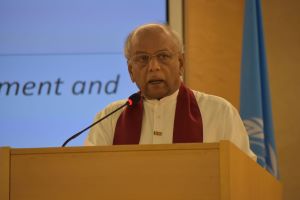
Madam President
Madam High Commissioner
Ladies and gentlemen,
As this Council is aware, in November 2019, the people of Sri Lanka gave a resounding mandate to President Gotabhaya Rajapaksa, to pursue a policy framework aimed at achieving the “four-fold outcome of a productive citizenry; a contented family, a disciplined, a just society and a prosperous nation”[1]. It is envisaged to achieve sustainable development and peace in the country, firmly anchored in safeguarding “national security without compromising the democratic space available to our people”[2].
It was over a decade ago, on 18 May 2009, that Sri Lanka defeated LTTE terrorism militarily, bringing to an end three decades of conflict and suffering. The end of the brutal conflict advanced, secured and protected one of the fundamental human rights – the ‘right to life’ for all Sri Lankans- Sinhalese, Tamil, Muslims and others. I would like to state with pride that since May 2009, not a bullet has been fired in the name of separatist terrorism in Sri Lanka.
Sri Lanka never had any illusion that the end of the conflict against the LTTE terrorists, will overnight convert to a lasting peace. Although Sri Lanka was not a case of nation building, like many conflict situations that this Council is dealing with, we were mindful that Sri Lanka needed certain reviews and strengthening of existing structures, as part of a sustainable peace and reconciliation programme.
The government led by the then President Mahinda Rajapaksa, of which the current President Gotabaya Rajapaksa was the Secretary to the Ministry of Defence, initiated a sustainable reconciliation process in Sri Lanka to bring about ‘healing and peace building’, taking due cognizance of the ground realities at that time. This was viewed as an incremental and inclusive process, as it had taken even better-resourced countries several decades to address and achieve.
Madam President,
As at December 2014, at the point the Mahinda Rajapaksa Government, of which I was a member, was concluding its term, we had made considerable progress in;
Notwithstanding these inclusive and locally designed measures, undertaken carrying along the people of Sri Lanka, a group of UNHRC members, failing to appreciate the GoSL’s endeavors in defeating terrorism and bringing about stability, humanitarian relief and lasting peace through a carefully balanced reconciliation process, moved consecutive country-specific resolutions at the UN HRC on Sri Lanka in 2012, 2013 and 2014.
Madam President,
The previous government in January 2015 jettisoned this home-grown reconciliation process which was bearing fruit. In an unprecedented move in the annals of the Human Rights Council, and contrary to Sri Lanka’s stance on country specific resolutions, the government at the time co-sponsored the UNHRC resolution 30/1 on Sri Lanka.
Substantively, the previous government “noted with appreciation”, the much flawed OISL Report, which was used as the basis not only for Resolution 30/1, but also to unjustly vilify the heroic Sri Lankan security forces, possibly the only national security establishment that defeated terrorism in recent times. This was despite there being an abundance of evidence to the contrary, contained in;
– domestic reports such as the LLRC and the ‘Paranagama Commission’
– information presented before the UK House of Lords by Lord Naseby,
challenging among other things the vastly exaggerated civilian casualty figures[3],
– other reports from the UN and international agencies including the ICRC
– as well as exposed diplomatic cables.
Constitutionally, the resolution seeks to cast upon Sri Lanka obligations that cannot be carried out within its constitutional framework and it infringes the sovereignty of people of Sri Lanka and violates the basic structure of the Constitution. This is another factor that has prompted Sri Lanka to reconsider its position on co-sponsorship.
Procedurally, in co-sponsoring Resolution 30/1, the previous Government violated all democratic principles of governance.
The commitments made, bound the country to carry out this experiment, which was impractical, unconstitutional and undeliverable, despite strong opposition and evidence that many of the undertakings couldn’t be carried out, merely to please a few countries.
In terms of reputational damage, it eroded Sri Lankans’ trust in the international system and the credibility of Sri Lanka as a whole in the eyes of the international community. This irresponsible action also damaged long nurtured regional relationships and Non-Aligned as well as South Asian solidarity. The deliberate polarization it sought to cause through trade-offs that resulted in Sri Lanka’s foreign policy being reduced to a ‘zero-sum game’, made my country a ‘pawn’ on the chess board of global politics, and unnecessarily drew Sri Lanka away from its traditional neutrality.
Most seriously, it is seen that the dictated changes in the country pursuant to 30/1, undermined the national interest and compromised national security, including weakening national intelligence operations and related safeguards, which are deemed to have contributed to the lapses that resulted in the Easter Sunday attacks in April 2019, which targeted churches and hotels, resulting in loss of life, including those of foreign nationals, which poses challenges to our government to restore national security.
It is ironic that, in March 2019, the previous government which co-sponsored Resolution 30/1 in October 2015, began the process of dismantling its dictates through the statement, made in this Council by my predecessor, which acknowledged the very real constraints that had been ignored 4 years before at the time of co-sponsoring this resolution. That statement sought to qualify the parameters of co-sponsorship of the Resolution. It questioned;
With the election of President Gotabaya Rajapaksa with an overwhelming majority, the people of Sri Lanka have given a clear signal for their wish for a different path forward for the country. As President Rajapaksa stated in his address at the 72nd Commemoration of Independence of Sri Lanka, “We will always defend the right of every Sri Lankan citizen to participate in the political and governance processes through his or her elected representatives”.
According to the wishes of the people of Sri Lanka, while following a non-aligned, neutral foreign policy, our government is committed to examining issues afresh, to forge ahead with its agenda for ‘prosperity through security and development’, and to find home-grown solutions to overcome contemporary challenges in the best interest of all Sri Lankans.
It is in this context that I wish to place on record, Sri Lanka’s decision to withdraw from co-sponsorship of Resolution 40/1 on ‘Promoting reconciliation, accountability and human rights in Sri Lanka’ which also incorporates and builds on preceding Resolutions 30/1 of October 2015 and 34/1 of March 2017.
Madam President,
Notwithstanding withdrawing from co-sponsorship of this Resolution, Sri Lanka remains committed to achieving the goals set by the people of Sri Lanka on accountability and human rights, towards sustainable peace and reconciliation. To this end;
Firstly, the Government of Sri Lanka declares its commitment to achieve sustainable peace through an inclusive, domestically designed and executed reconciliation and accountability process, including through the appropriate adaptation of existing mechanisms, in line with the Government’s policy framework. This would comprise the appointment of a Commission of Inquiry (COI) headed by a Justice of the Supreme Court, to review the reports of previous Sri Lankan COIs which investigated alleged violations of Human Rights and International Humanitarian Law (IHL), to assess the status of implementation of their recommendations and to propose deliverable measures to implement them keeping in line with the new Government’s policy.
Secondly, the Government will also address other outstanding concerns and introduce institutional reforms where necessary, in a manner consistent with Sri Lanka’s commitments, including the 2030 Sustainable Development Agenda (SDGs). We will implement policies rooted in the Government’s commitment to the people by advancing individual and collective rights and protections under the law, ensuring justice and reconciliation and addressing the concerns of vulnerable sections of society. A discussion has already been held between the President and the UN Resident Coordinator where it has been agreed to connect the relevant UN agencies to help the Government of Sri Lanka in the implementation of the SDGs.
Thirdly, Sri Lanka will continue to remain engaged with, and seek as required, the assistance of the UN and its agencies including the regular human rights mandates/bodies and mechanisms in capacity building and technical assistance, in keeping with domestic priorities and policies.
Finally, in conjunction with all members of the UN, Sri Lanka will seek to work towards the closure of the Resolution.
Madam President,
No one has the well-being of the multi-ethnic, multi-lingual, multi-religious and multicultural people of Sri Lanka, closer to their heart, than the Government of Sri Lanka. It is this motivation that guides our commitment and resolve to move towards comprehensive reconciliation and an era of stable peace and prosperity for our people. It is therefore our strong conviction that the aforementioned actions within the framework of Sri Lanka’s domestic priorities and policies, are not only realistic but also deliverable.
We call upon all stakeholders, within and outside this august body, to cooperate with Sri Lanka, in this endeavor.
May I conclude quoting the words of Lord Buddha,
“Siyalu sathwayo niduk wethwa, nirogee wethwa, suwapath wethwa”.
May all beings be safe
May all beings be free from suffering,
May all beings be well and happy.
Thank you.

Minister of Foreign Relations, Skills Development, Employment and Labour Relations – Dinesh Gunawardena who leads the Sri Lanka delegation to the 43rd Session of the Human Rights Council arrived in Geneva a short while ago.
The Minister is scheduled to address the High Level Segment of the Human Rights Council (HRC) on Wed 26 February, where he will formally inform the Council Members of the decision of the Government of Sri Lanka to withdraw its co-sponsorship of Resolution 40/1 of March 2019 on ‘Promoting reconciliation, accountability and human rights in Sri Lanka’, which also incorporates and builds on preceding Resolutions 30/1 of October 2015 and 34/1 of March 2017.
Minister Gunawardena will also respond to the Oral Update on Sri Lanka by the High Commissioner on 27 February.
He will meet the High Commissioner for Human Rights Michelle Bachelet on Friday 28 February.
The Sri Lanka Delegation to the current Session includes State Minister of Public Administration and Home Affairs Mahinda Samarasinghe, Foreign Secretary Ravinatha Aryasinha, Additional Secretary to the President Admiral (Retd) Jayanath Colombage, Deputy Solicitor General Nerin Pulle, Director General of the UN and Human Rights Division of Ministry of Foreign Relations Mr. M.R.K. Lenagala, Senior State Counsel Kanishka Balapatabendi, Brigadier E.S. Jayasinghe from the Ministry of Defence and Coordinating Secretary to the Minister of Foreign Relations Subash Sri Wijethunga.
Acting Permanent Representative of Sri Lanka to the UN in Geneva Dayani Mendis and relevant staff will join the delegation during the session and meetings.
During his stay in Geneva, Minister Gunawardena will also meet with the Director Generals of the United Nations Office in Geneva (UNOG), the International Labour Organisation (ILO), the International Organisation for Migration (IOM) and the Secretary- General of the Inter-Parliamentary Union (IPU).
Sri Lanka Permanent Mission
Geneva
25 February 2020
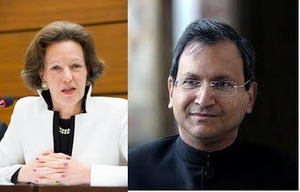
Ahead of the upcoming 43rd Session of the Human Rights Council (HRC) scheduled to commence next Monday (24 February), Foreign Secretary Ravinatha Aryasinha briefed the President of the HRC Ambassador Elisabeth Tichy-Fisslberger on the decision of the Government of Sri Lanka to withdraw its co-sponsorship of Resolution 40/1 of March 2019 on ‘Promoting reconciliation, accountability and human rights in Sri Lanka’, which also incorporates and builds on preceding Resolutions 30/1 of October 2015 and 34/1 of March 2017.
The Foreign Secretary who is presently in Geneva, on Friday (21 February) informed the President that the Cabinet of Ministers had on Wednesday approved this decision following a cabinet paper submitted by Foreign Relations Minister Dinesh Gunawardena. The decision had also been presented to the Parliament on Thursday. He also informed her that Minister Gunawardena will lead the Sri Lanka delegation to the 43rd Session of the Human Rights Council, and will formally inform the Council Members on the Government’s decision when he addresses the High Level Segment of the Council, on Wednesday 26 February. Minister Gunawardena who will also respond to the Oral Update on Sri Lanka by the High Commissioner on 27 February, is scheduled to meet the High Commissioner for Human Rights Michelle Bachelet, during his stay in Geneva.
She was also informed by the Foreign Secretary that on the eve of the decision being taken by the Cabinet, the Ambassadors of the ‘core group’ that had moved the resolution, who were resident in Colombo ( the UK, Germany and Canada), had also been briefed by Minister Gunawardena.
Ambassador Tichy-Fisslberger appreciated Sri Lanka’s initiative to keep her briefed on the matter.
Sri Lanka Permanent Mission
Geneva
21 February 2020

“Timelines evolved externally in achieving stated objectives would only seek to hinder the process of reconciliation since they would be bereft of ground realities” emphasized Sri Lanka’s Permanent Representative to the United Nations Ambassador Kshenuka Senewiratne during a one day debate at the UN Security Council titled “Peacebuilding and Sustaining Peace: Transitional Justice in conflict and post-conflict situations,” held on 13th February 2020. She added that when seeking mechanisms of transitional justice, related simple theories would need to also take cognizance of the various historical, cultural and religious sensitivities.
Ambassador Senewiratne stated that the basic tenet of a transitional justice process is the application of its theoretical principles on State obligations and it is the State that needs to pursue truth, justice, reparations and guarantees of non-recurrence. She further explained that the post conflict milieu of each country is unique and those traversing the path of post-conflict transition and reconciliation have often made deliberate efforts to maintain a balance between the speed of the transitional justice process and desired standard which includes inclusiveness and the sustainability.
The Permanent Representative referred to the newly elected President, His Excellency Gotabaya Rajapaksa having pledged to work towards guaranteeing human rights and political and economic freedom for his people in a truly democratic Sri Lanka. She added that the President had also espoused that every citizen of Sri Lanka has the right to live freely and securely, holding independent opinions, following the religion of choice and freedom of association and assembly, being rights that no one can challenge.
The Permanent Representative sought to reiterate that the action by the Sri Lankan security forces during the conflict was against a group designated as a terrorist organization by many countries, and even described as ruthless by some, and not aimed at any community in the country. She elaborated that the modus operandi of suicide attacks adopted by this terrorist group, which for the first time in history deliberately targeted civilians, is now being emulated expansively by similar groups globally.
She observed that promoting a peaceful, just and reconciled society is not only an objective in itself, but also a pre-requisite for a sustainable and inclusive approach to development that leaves no one behind. The Permanent Representative upheld that as a sovereign State, Sri Lanka will continue to establish its own priorities towards this end, adding that the country’s experience has taught that certain lessons can be learnt from others, but that it is imperative to chart its own path to reconciliation in order for it to be sustainable. She outlined that Sri Lanka was committed to find innovative and pragmatic solutions, driven by the domestic context to protect the country’s national interest, guided by the provisions of the Constitution, and the will of the citizens, expressed through democratic means.
Ambassador Senewiratne informed the Security Council that Sri Lanka’s engagement at the debate was in keeping with the Government’s vision for a country that embodies the universal values of human rights, justice, rule of law and good governance, while ensuring economic dividends to its people. She concluded, that Sri Lanka looks forward to continuing its cooperation with the international community through capacity building and technical assistance in mutually agreed areas, in keeping with domestic priorities and policies.
The debate was the initiative of Belgium, which is holding the Presidency of the Security Council for the month of February 2020 and was chaired by the Belgian Foreign Minister. The UN High Commissioner for Human Rights Michelle Bachelet, Father Francisco de Roux, President Commission for the Clarification of Truth, Coexistence and non-repetition of Colombia and Ms. Yasmin Sooka, Executive Director of the Foundation for Human Rights in South Africa, Trustee of the Desmond Tutu Peace Centre and Chair of the Commission on Human Rights in South Sudan provided briefings at the commencement of the debate.
Permanent Mission of Sri Lanka to the United Nations
New York
13 February 2020
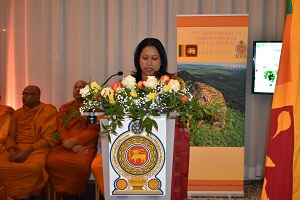
The Permanent Mission of Sri Lanka to the United Nations (UN) and the World Trade Organisation (WTO) in Geneva marked the 72nd anniversary of Sri Lanka’s independence at a solemn ceremony held on 4 February 2020 at the World Intellectual Property Office (WIPO) premises in Geneva.
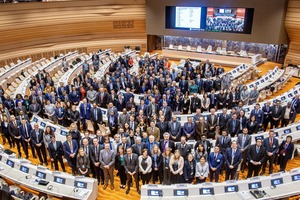
Sri Lanka's Permanent Representative to the UN in Geneva Ambassador A.L.A. Azeez takes over the Chairmanship of the 2020 States Parties' Meeting from Ambassador Yann Hwang of France, the outgoing Chair.
Sri Lanka's chairmanship, as the Convention marks 45 years of its entry into force next year and as the State Parties convene throughout 2020 a series of expert meetings and preparatory meetings building up towards the Ninth Review Conference in 2021, is highly significant for strengthening international cooperation and assistance to fully realise its objectives alongside universalisation and sustained focus on national implementation.
The Convention on the Prohibition of the Development, Production and Stockpiling of Bacteriological (Biological) and Toxin Weapons and on their Destruction, popularly known as Biological Weapons Convention (BWC) prohibits biological and toxin weapons through their entire cycle, and is a key element in the international community’s efforts to address the proliferation of weapons of mass destruction and States Parties’ endeavours to improve national security in an increasingly volatile global environment.
Permanent Mission of Sri Lanka
6th December 2019
Geneva
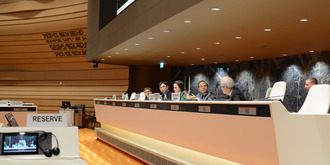
Ambassador A.L. Abdul Azeez, Sri Lanka’s Permanent Representative to the United Nations Office at Geneva recently chaired a panel at the Debt Management Conference organized by the United Nations Conference on Trade and Development (UNCTAD). This conference, which is organized every two years by the UNCTAD provides a regular forum for sharing experiences and exchanging views between Governments, international organizations, academia, the private sector, and civil society on current issues in public finance, debt management and the debt crisis prevention.
This year’s Debt Management Conference brought together senior-level national and international debt managers and experts from around the world to discuss some of the most pertinent topics in both external and domestic debt, debt management and public finance.
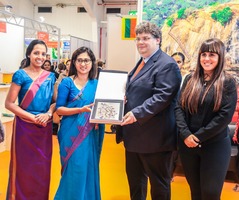
The Permanent Missions of Sri Lanka to the UN and WTO in Geneva, in collaboration with Sri Lanka Tourism Promotion Bureau, organized Sri Lanka’s participation at the Swiss International Holiday Exhibition for the second consecutive year, successfully from 1st to 3rd November 2019.
The Sri Lanka Pavilion at the Swiss International Holiday Exhibition was inaugurated on 1st November 2019 in the presence of Ambassador (Mrs) Gothami Silva, the Permanent Representative of Sri Lanka to the World Trade Organization in Geneva, Mr. Marco Peon, the Chief Organizer of the Exhibition and other dignitaries.
The Swiss International Holiday Exhibition, also known as IVIAGGIATORI, is the prestigious tourism event in the Italian-speaking part of Switzerland, which belongs to the network of the most important European tourism fairs. Leading to a perfect trip around the world, through places, peoples and cultures, IVIAGGIATORI is recognised as an ideal event for travellers and people working in the tourism industry. Every year, it showcases the most fascinating destinations and the best facilities in five continents, including services provided by international tour operators and different packages of tourism.
Sri Lanka Pavilion was a major highlight at this year’s Exhibition. Under the patronage of Sri Lanka Tourism Promotion Bureau, eight (08) companies from tourism industry took part this year. Sri Lankan traditional cultural performances and Ceylon Tea serving counter attracted more visitors to the Sri Lanka Pavilion. Through the bilateral meetings the industry representatives had with the visitors, a significant number of successful client contacts had been secured. IVIAGGIATORI being a consumer tourism fair, the industry representatives were highly impressed with the number of direct contacts they could build up during the Exhibition and encouraged to have Sri Lanka’s continuous participation at this Exhibition.
With more than 200 stands representing over 30 countries, institutional seminars and thematic events, the 2019 edition of the Swiss International Holiday Exhibition attracted diverse categories of visitors, including families, young couples, singles, students, pensioners, etc. both from Switzerland, as well as from neighbouring Italian regions.
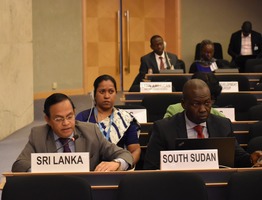
Speaking at the General Debate of the 70th session of the Executive Committee of the United Nations High Commissioner for Refugees (UNHCR), Ambassador A.L.A. Azeez, Permanent Representative of Sri Lanka, outlined measures taken by Sri Lanka to address the issue of statelessness. The meeting, chaired by Ambassador Boudjemâa Delmi of Algeria, takes place from 7-11 October 2019, with the participation of Mr. Filippo Grandi, the UN High Commissioner for Refugees.
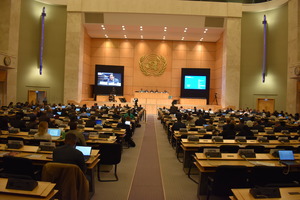
Full Statement by Ambassador Azeez
Permanent Mission of Sri Lanka
Geneva
09th October 2019
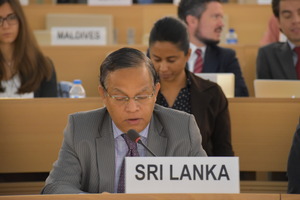
Speaking at the 2019 Social Forum of the Human Rights Council on 1st October 2019, in Geneva, the delegation of Sri Lanka highlighted the importance of education, a fundamental human right that lies at the core of the 2030 Development Agenda, in the promotion and protection of human rights of children and youth and the transformative power it entails.
At the multi stakeholder meeting, which brought together Government representatives, intergovernmental organizations, civil society and the academia, Ambassador A.L.A. Azeez, Sri Lanka’s Permanent Representative to the UN in Geneva noted that all children and youth have an equal right to an education in a safe and secure setting irrespective of their gender, family income levels, religion, ethnicity, or geographical location and that a hate-free atmosphere that inculcates in children and youth the value of inclusivity and diversity is a crucial element in education that helps build lasting peace and contributes to the strengthening of the social fabric.
Empowering children and youth through access to quality education and ensuring that no child is left behind, is key to achieving sustainable development goals, stressed Ambassador Azeez. He shared Sri Lanka’s experiences in providing education to all and its commitment to promote and protect the right to education for all its citizens as enshrined in Sri Lanka’s laws and regulations.
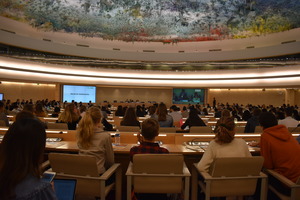
He added that in order to ensure the special education needs of children with disabilities, 714 schools provide special education through designated units in government schools for disabled children and a special scheme of university admissions for persons with disabilities also exist.
“Such measures have resulted in remarkable social indicators in Sri Lanka in recent years, such as high enrolment rates in education, reduction of school drop-outs and universal primary education reaching 99.7% in 2014” Ambassador Azeez re-iterated.
Permanent Mission of Sri Lanka
Geneva
01 October 2019